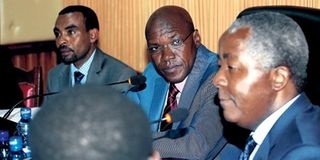Audit tells of illegal bank accounts run by county governments

Senate Public Accounts and Investments Committee chair Boni Khalwale (centre). Junior county officials who appear before senators to represent governors will be asked to refund their allowances, a Senate committee said on Thursday. FILE PHOTO |
What you need to know:
- Some counties are still using stationery bearing the letterheads of the defunct local authorities.
- Auditor-General Edward Ouko points out that the TA had the responsibility of ensuring a smooth and seamless transition process in accordance with the law.
As governors and the Opposition clamour for more money for counties, millions of shillings remain unaccounted for in bank accounts of the defunct local authorities.
This state of affairs was revealed after it appeared that some counties had ignored instructions from the Transition Authority (TA) to close the accounts.
Some counties are still using stationery bearing the letterheads of the defunct local authorities, raising fears that some of the revenue being collected at the county level could be ending up in the wrong hands.
According to a circular signed by then Local Government permanent secretary Prof Karega Mutahi, all clerks of the local authorities were asked to close the bank accounts by February 28, 2013 and prepare statements of accounts for subsequent transfer to new accounts to be run by county governments.
EMPLOYED OWN STAFF
During the three-month period that the accounts remained dormant as new accounts were being opened, funds in these accounts could only be spent on paying outstanding bills entered before the date. Balances of the funds were to be transferred to the new accounts.
However, some governors frustrated transition officers from the TA who had been sent to the counties in mid-February, 2013 to help governors set up the county treasuries and other structures.
In fact, some insisted on employing their own staff, rendering these interim officials redundant.
The shocking revelations came to the fore during a series of sessions between the Senate County Public Accounts and Investment Committee and governors invited to respond to audit queries about expenditure in their counties.
Committee chairman Dr Boni Khalwale expressed concern that some counties were still operating bank accounts of the municipal and county councils, alongside new ones that were opened when the county governments became operational.
In Uasin Gishu, for instance, 13 bank accounts from the Municipal council of Eldoret and Wareng County Council remained operational by as long as five months after the county governments had been installed, according to a report from the Auditor-General’s office.
The accounts held some Sh150 million by August 2013.
“This is the tip of the iceberg. We have many other cases. As a committee, we are interested to know why the affected counties ignored instructions from TA, and track the expenditure of these funds,” said Dr Khalwale.
“We want to establish whether spending of money in these accounts is being done in accordance with laid down procedures,” Dr Khalwale, whose committee has prompted some governors opposed to its summons to seek court protection, added.
Though the opposition, led by Raila Odinga, and governors led by the Council of Governors chair Isaac Ruto, claim they are not working together, both are in agreement that they want devolved fund allocations increased from the current minimum of 15 per cent to at least 45 per cent of the national budget.
Dr Khalwale said although he is one of legislators pushing for more funds for development in the counties, he is disagrees with those who say governors should be shielded from accounting for the public funds.
The law, he says does not allow senators to decide who should hold them accountable. Governors have been arguing that it is the members of county assemblies (MCAs) and not the senators who should question their spending.
Senator Mong’are Bw’Okong’o (Nyamira, Ford-K) regretted that courts are being used to frustrate Parliament from carrying out its constitutionally mandated oversight role in disregard of the doctrine of separation of powers.
The senator said there is no harm in governors, as custodians of public resources, appearing before Parliament to account for taxpayers’ money.
“As we push for more resources to go to the counties to steer development, we have to ensure the county governments properly account for the resources. It is one of our core mandates as champions of county affairs,” said Mr Bw’okong’o.
He blamed the Transition Authority for the hiccups, saying the counties were not guided properly on how to go about the transition process.
CREATED MESS
“We shall handle this issue of closing of bank accounts on a case-by-case basis because in some counties the officers sent from the TA contributed to the current mess by allowing some governors to operate illegal bank accounts,” the senator said.
Auditor-General Edward Ouko whose reports have formed the basis of the audit queries, points out that the TA had the responsibility of ensuring a smooth and seamless transition process in accordance with the law.
The process of taking over of assets and liabilities, including the staff of the defunct Local Authorities, he observed, is still open to question in many counties due to lack of adequate leadership by the TA.
Prof Anyang’ Nyong’o (Kisumu, ODM) said officials from TA must also be held responsible for taking such a long time to ensure the law was upheld.
“They should explain why didn’t they make the law clear to the counties and ensure compliance,” he said.
But TA chairman Kinuthia wa Mwangi differs with those pointing an accusing finger at the authority.
He said the officers were sent to help counties open two accounts a receipting account and an imprest account, at the Kenya Commercial Bank, National Bank of Kenya, Cooperative or Consolidated Banks.
They were also tasked with overseeing the process of opening County Revenue Fund Accounts, at the Central Bank of Kenya, and two operational accounts for recurrent and development expenditure.




